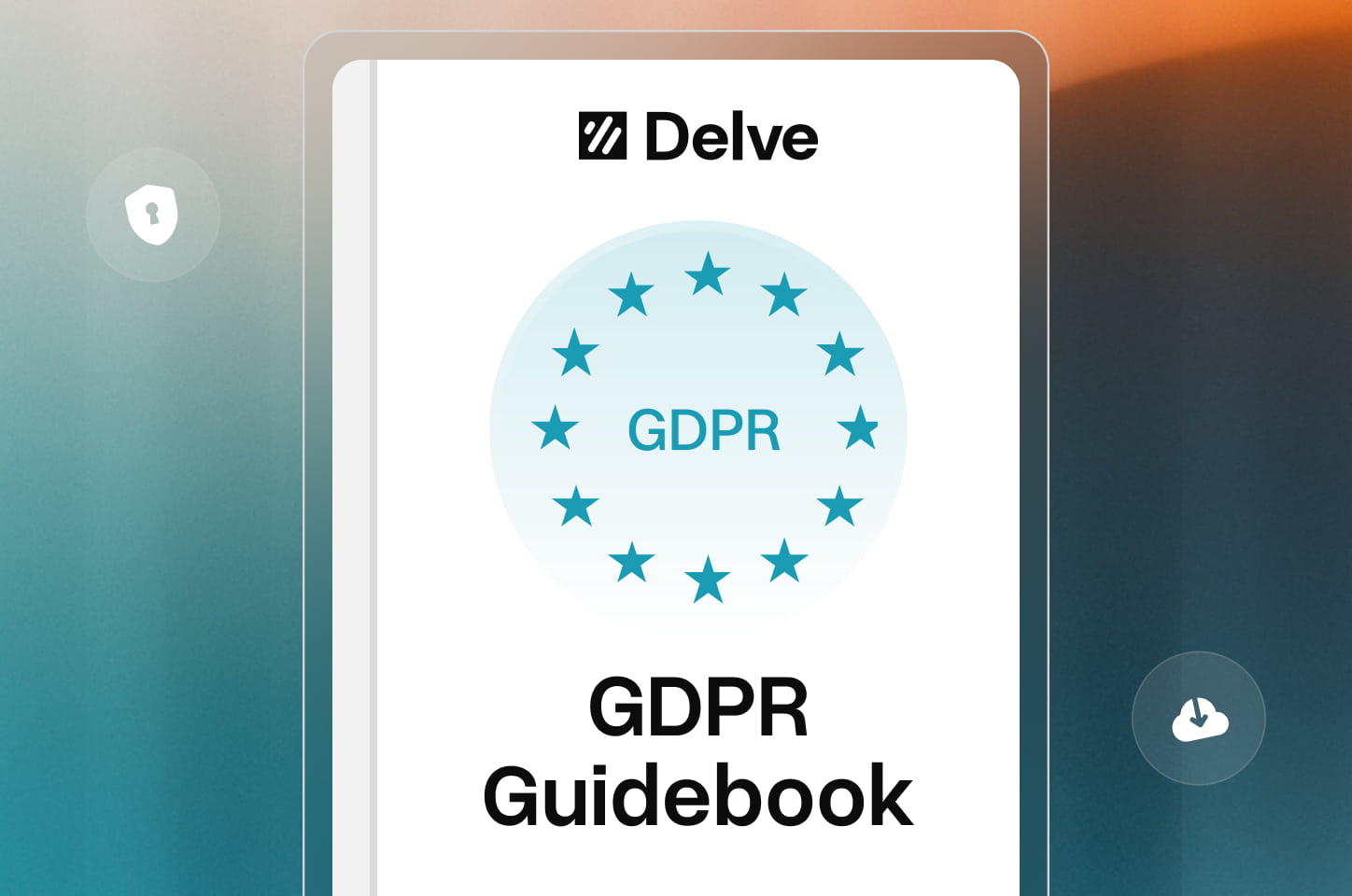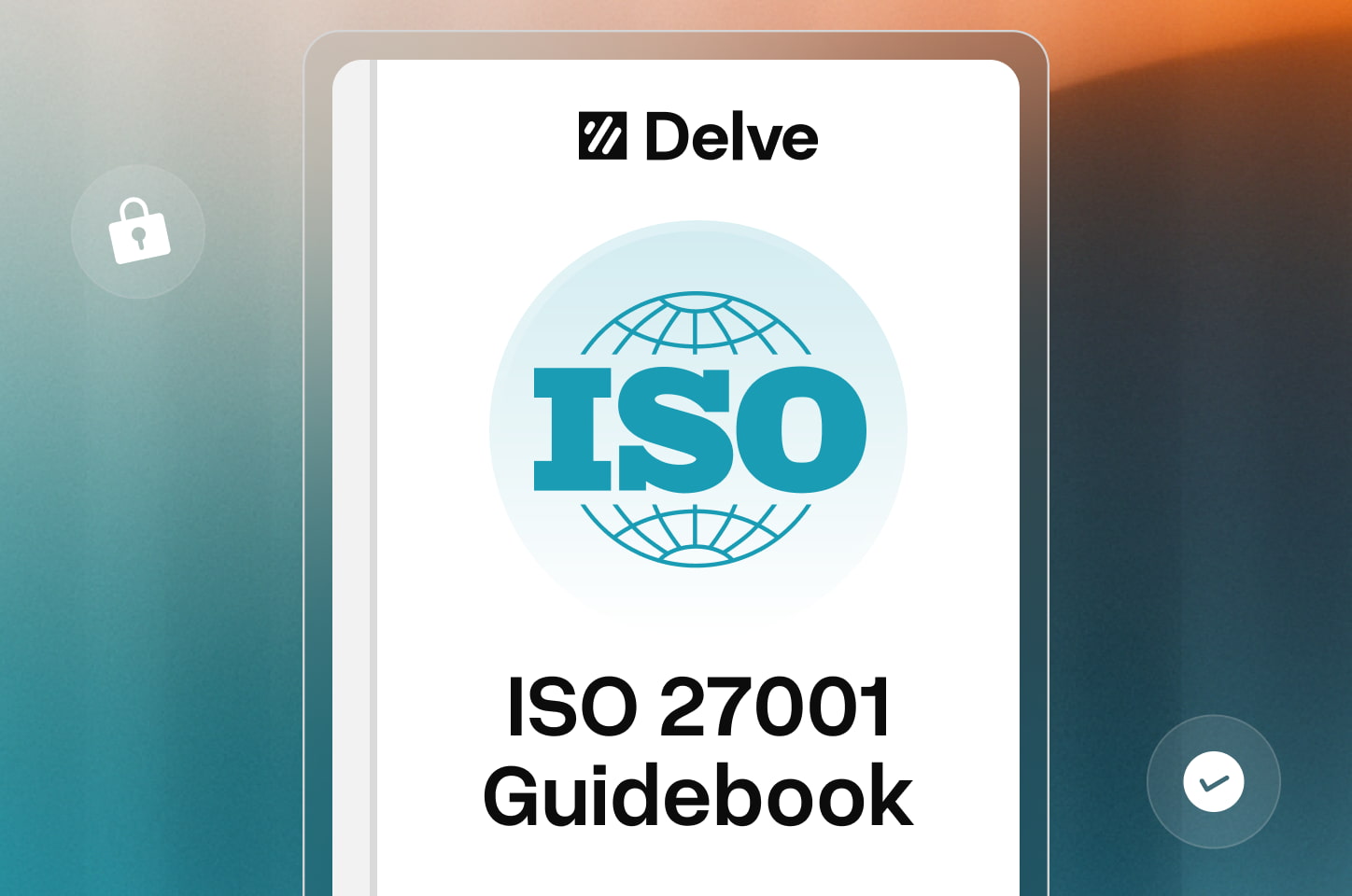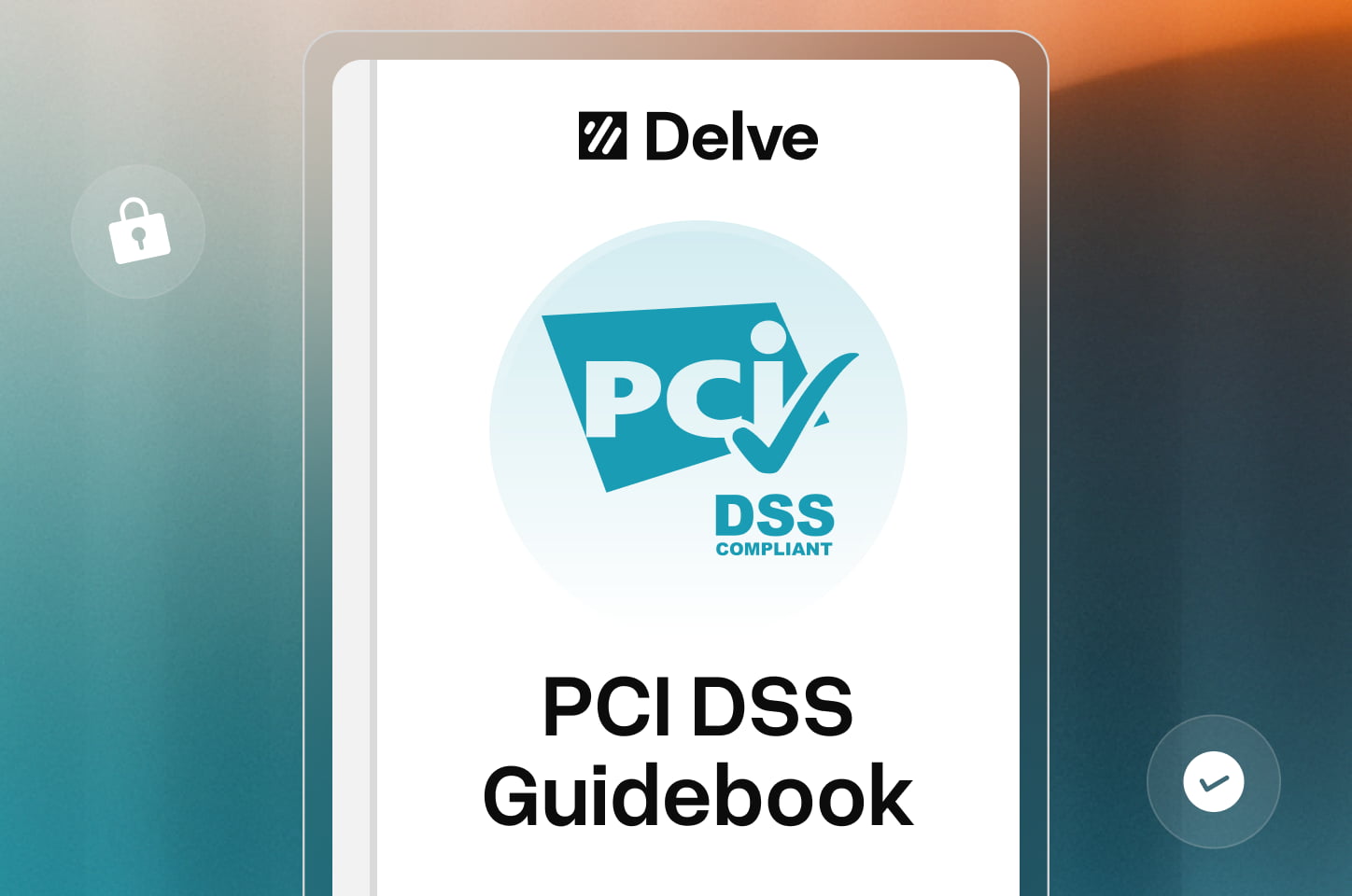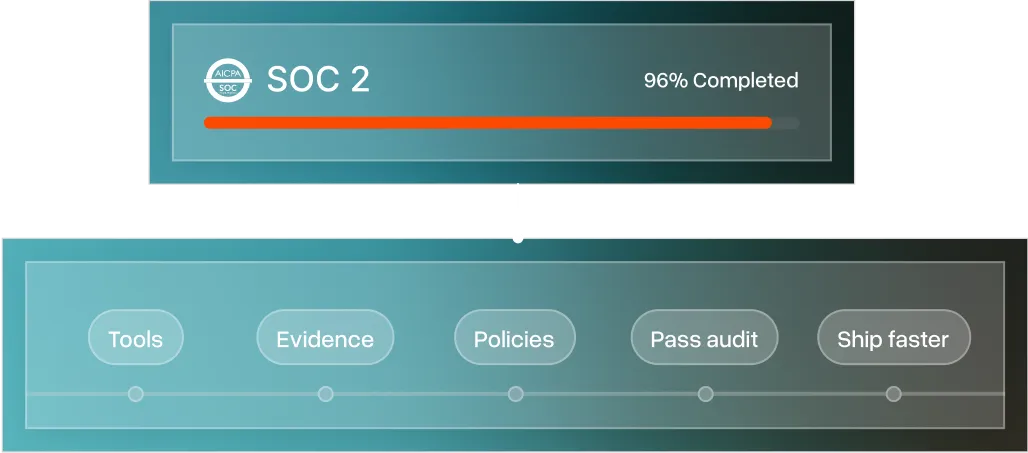What is GDPR? The Complete GDPR Compliance Guide for Startups
A fast-track GDPR guide for startups: become compliant in 10-15 hours, avoid fines, protect data, and build trust with EU customers.

Learn how to get GDPR compliant in 10-15 hours with this comprehensive guide. Discover GDPR principles, compare GDPR vs SOC 2, and find the best GDPR compliance solutions for startups.
Starting a company is hard enough without worrying about European privacy laws. Yet here you are, probably because an investor asked about your GDPR compliance, a potential enterprise customer requires it, or you just realized those website visitors from Berlin might mean you need to care about data protection. The good news? GDPR compliance doesn't have to be the months-long, expensive nightmare you've heard about.
This guide cuts through the complexity to show you exactly what GDPR means for your startup, why it matters more than you think, and how to get GDPR compliant in 10-15 hours instead of the industry standard 60-100+ hours. We'll cover everything from the basics to advanced implementation strategies, all in language that makes sense even if you've never touched compliance before.
What is GDPR? Understanding the GDPR Principles for Your Startup
The General Data Protection Regulation (GDPR) is Europe's comprehensive data protection law that became effective on May 25, 2018. In simple terms, GDPR sets rules for how businesses—no matter how small—should protect personal data of EU residents and handle privacy systematically.
At its core, GDPR operates on eight fundamental principles that shape everything else:
- Lawfulness, fairness, and transparency - You need a valid legal reason to process data and must be open about what you're doing
- Purpose limitation - Collect data only for specified, explicit purposes
- Data minimization - Only gather what you actually need
- Accuracy - Keep personal data accurate and up to date
- Storage limitation - Don't keep data longer than necessary
- Integrity and confidentiality - Protect data with appropriate security
- Accountability - Document everything and prove your compliance
- Rights of individuals - Respect data subject rights to access, correct, and delete their data
These principles translate into concrete requirements through 99 articles organized into 11 chapters, but don't worry - you don't need to memorize all of them. What matters for startups are the practical implications.
A Brief History of GDPR
Understanding GDPR is easier when you know its background:
- 1995: The EU Data Protection Directive was adopted, setting early privacy standards across Europe.
- 2012: The European Commission proposed GDPR to update the outdated 1995 directive.
- 2016: GDPR was formally adopted by the European Parliament, replacing the directive.
- 2018: GDPR officially came into effect, transforming global data privacy standards.
GDPR isn’t a passing trend—it’s the global standard influencing privacy regulations worldwide, including the California Consumer Privacy Act (CCPA) and Brazil’s LGPD. Achieving GDPR compliance places your startup at the forefront of data protection practices globally.
GDPR Compliance Framework and Key Components
GDPR compliance involves a structured approach, similar to ISO 27001, and includes:
Management Requirements
- Identify Your Role: Determine if you're a data controller (deciding how data is processed) or a data processor (handling data for another entity).
- Conduct Data Inventory and Mapping: Understand what personal data you collect, why, and how it flows through your systems.
- Establish a Legal Basis: Document a clear legal justification (consent, contract, legitimate interests, etc.) for each type of data processing.
- Privacy Policy and Documentation: Clearly articulate how you handle personal data through transparent policies and procedures.
- Training and Awareness: Ensure your team understands their GDPR responsibilities.
- Vendor Management: Maintain Data Processing Agreements (DPAs) with third-party vendors who handle data.
Technical and Operational Controls
- Data Protection Measures: Implement appropriate security controls (encryption, access control, multi-factor authentication).
- Data Subject Rights: Establish clear processes for handling requests related to data access, correction, deletion, and portability.
- Incident Response: Develop robust procedures for handling data breaches, including mandatory 72-hour reporting.
GDPR Documentation Essentials
Key GDPR documents include:
- Privacy Policy
- Cookie Policy
- Record of Processing Activities (ROPA)
- Data Processing Agreements (DPAs)
- Incident Response Plan
- Consent Management Procedures
Platforms like Delve simplify this process through AI-driven documentation and automation, significantly reducing manual efforts.
How Long Does It Take to Get GDPR Compliant? Comparing GDPR Compliance Solutions
Here's where traditional GDPR compliance services have failed startups. Traditional approaches involve:
- Consultants: 100+ hours of billable time, 4-12 week timelines, $15,000-50,000+ costs
- Generic GDPR compliance software: 60+ hours of setup, months of back-and-forth, boilerplate policies that don't fit your business
- DIY attempts: 150+ hours piecing together templates, hoping you got it right
The reality? With the right GDPR compliance solutions, comprehensive GDPR compliance takes 10-15 hours. Not months. Not weeks. Hours.
One Delve customer, LedgerUp, achieved full compliance in ~20 hours over just two days. Their review: "Intuitive tech, simple policies, AI-generate and move on." They didn't need extensive onboarding calls or legal consultations - just clear guidance and smart automation.
How to Get GDPR Compliant: The Complete Process Roadmap
Getting GDPR compliant follows a logical progression that builds on itself. Here's the complete process broken into manageable phases:
Phase 1: Assessment and Classification
Start by understanding your data landscape:
- Determine your role: Are you a controller (you decide what to do with data) or processor (you handle it for others)?
- Map your data flows: What personal data do you collect, where does it go, and why?
- Identify special categories: Do you handle health, biometric, or other sensitive data?
- Document retention periods: How long do you keep different types of data?
Phase 2: Legal Foundation
Establish the legal framework for your processing:
- Define legal basis for each processing activity (contract, legitimate interest, consent)
- Create your privacy policy, DPA, and cookie policy with all required GDPR elements
- Implement cookie consent for your website
- Draft your Record of Processing Activities (ROPA) if you’re required too
Phase 3: Technical Implementation
Implement appropriate technical and organizational measures:
- Encryption: Implement TLS 1.2+ for data in transit, encrypt sensitive data at rest
- Access controls: Role-based permissions, multi-factor authentication, principle of least privilege
- Monitoring: Activity logging, intrusion detection, vulnerability scanning
- Security policies: Password requirements, incident response procedures, backup systems
Phase 4: Rights and Processes
Enable data subject rights:
- Create request forms for access, rectification, erasure, and portability
- Establish response procedures with 30-day timelines
- Implement consent management for marketing and optional processing
- Set up breach notification processes (72-hour requirement to authorities)
Phase 5: Vendor Management
Ensure your entire data ecosystem is compliant:
- Review all data processors (cloud providers, email services, analytics tools)
- Execute Data Processing Agreements (DPAs) with each vendor
- Verify international transfer mechanisms (Standard Contractual Clauses, adequacy decisions)
- Document vendor security assessments
Is there an audit? Who enforces GDPR?
Unlike SOC 2 or ISO 27001, GDPR doesn't require formal audits or certification. Instead, enforcement happens through:
Data Protection Authorities (DPAs)
Each EU member state has its own DPA that investigates complaints and conducts reviews:
- Ireland's DPC: Oversees many tech companies due to EU headquarters
- France's CNIL: Known for aggressive enforcement
- Germany's BfDI: Strict on consent and transparency
- UK's ICO: Continues post-Brexit enforcement under UK GDPR
How Enforcement Actually Works
DPAs typically investigate based on:
- Individual complaints (most common trigger)
- Data breach notifications (mandatory 72-hour reporting)
- Media coverage of potential violations
- Proactive sector sweeps (targeting specific industries)
- Whistleblower reports
The investigation process usually provides opportunities to remediate issues before fines, especially for good-faith compliance efforts. However, willful violations or poor incident response dramatically increase penalty risks.
Best Practice: Internal Audits
While not required, smart startups conduct informal internal reviews:
- Quarterly: Review access controls, update documentation
- Semi-annually: Audit international transfers, test incident response
- Annually: Comprehensive compliance assessment, policy updates
Who should pursue GDPR compliance?
The short answer: any startup that might handle EU resident data needs GDPR compliance. But let's get specific about when it becomes critical:
You Should Comply If You:
- Have any customers, users, or website visitors from the EU
- Process EU employee or contractor data
- Offer goods or services to the EU market (even free ones)
- Monitor behavior of EU residents (analytics, advertising)
- Plan to expand to Europe within the next year
The Simplest Compliance Approach
If you're just starting and unsure about EU exposure, implement baseline compliance:
- Privacy policy in your website footer covering GDPR requirements
- Cookie consent banner for EU visitors
- Basic data security measures (HTTPS, access controls)
- Email marketing consent mechanisms
This foundation costs almost nothing and prevents major issues while you grow. As you scale, you can add comprehensive documentation, formal processes, and advanced security measures.
GDPR for Startups: Essential Questions Answered
Before diving into implementation details, let's address the questions that keep startup founders up at night:
"Am I a data controller or processor?"
This distinction determines your entire compliance approach. You're a controller if you decide why and how to process personal data - which describes most startups using customer data for their own purposes. You're only a processor if you handle data solely on behalf of another company according to their instructions. Most SaaS platforms, for instance, act as processors for their customers' data but controllers for their own marketing and user data.
"Do I really need explicit consent for everything?"
No, and this is where many startups overcomplicate things. GDPR recognizes six legal bases for processing data:
- Contract performance (you need their data to deliver your service)
- Legal obligation (required by law)
- Vital interests (life-or-death situations)
- Public task (government functions)
- Legitimate interests (your business needs, balanced against individual rights)
- Consent (explicit opt-in)
For B2B startups, contract performance often covers customer data processing. Marketing to EU residents requires consent, but serving existing customers typically doesn't.
"What counts as personal data under GDPR?"
Personal data includes any information relating to an identified or identifiable person. Names and emails are obvious, but it also includes IP addresses, cookie identifiers, location data, and even employee data. Special categories requiring extra protection include health data, biometric data, political opinions, and religious beliefs.
For example, a photo of a street in the hands of a photographer is not personal data, while that same photo in the hands of an investigator who is working to identify the individuals and vehicles that were present on that street at that particular time would be considered personal data for the individuals concerned.
- GDPR Official https://gdpr.eu/eu-gdpr-personal-data/
"What happens if I don't comply?"
GDPR enforcement isn't theoretical. Data Protection Authorities (DPAs) across Europe actively investigate complaints and can issue fines up to 4% of global annual revenue or €20 million, whichever is higher. While massive fines against tech giants make headlines, DPAs also pursue smaller companies, especially after data breaches or customer complaints.
However, the GDPR cares a lot about intentionality. If you’re a small company making an honest effort, you’re not going to get in trouble.
GDPR vs SOC 2, ISO 27701, and Other Privacy Frameworks
Understanding how GDPR compares to other regulations helps you build an efficient multi-jurisdiction compliance strategy:
GDPR vs CCPA/CPRA (California)
Most modern US privacy law was directly built off of the GDPR, so in general you’ll see a ton of similarity.
SOC 2 vs GDPR: Key Differences
While both focus on data protection, they serve different purposes:
For startups: GDPR compliance is legally required if you have EU users, while SOC 2 is typically required by enterprise customers. Many implement both simultaneously since they share security requirements.
ISO 27001 vs GDPR
ISO 27001 is generally a standard for managing information security through the development of the ISMS and risk procedures. It doesn’t have a ton of privacy coverage - but ISO 27701 was developed in response and extends ISO 27001 to cover privacy:
- International standard for privacy management
- Certification-based approach
- Helps demonstrate GDPR compliance
- More comprehensive than GDPR alone
Strategic approach: GDPR compliance is the legal minimum; ISO 27701 certification proves your commitment to privacy beyond compliance.
If you get compliant with ISO 27701, you’re pretty much all the way there with GDPR as well and you have a certification to prove it!
The Global Privacy Landscape
Most to Least Stringent:
- GDPR - Highest penalties, broadest rights, strictest requirements
- Quebec Law 25 - GDPR-like with significant penalties
- LGPD (Brazil) - Similar structure to GDPR, 2% revenue penalties
- CPRA (California) - Enhanced CCPA with sensitive data protections
- Virginia/Colorado/Connecticut - Business-friendly with cure periods
- PIPEDA (Canada) - Reasonable approach with lower penalties
Strategic Approach: Build your privacy program to GDPR standards, then adjust down for less stringent jurisdictions. It's much easier to relax requirements than to add them later. Most US and modern privacy law is built off of the GDPR anyways.
How to Get GDPR Compliant Today: Your Action Plan
Ready to move beyond understanding what is GDPR into actually achieving compliance? Here's your practical roadmap for GDPR compliance for startups:
Week 1: Foundation Building
Day 1-2: Quick Wins
- Install a cookie consent solution on your website (free tools available)
- Add a basic privacy policy to your footer
- Create a dedicated privacy email (privacy@yourcompany.com)
Day 3-4: Assessment
- Map out all the personal data you collect
- Determine your legal basis for each processing activity
- Identify which vendors have access to personal data
Day 5: Documentation Start
- Begin your Record of Processing Activities (ROPA)
- List all your data processing vendors
- Draft data subject request procedures
Week 2: Implementation
Technical Security:
- Verify HTTPS across all domains
- Implement access controls and MFA
- Review password policies and authentication
- Set up activity logging
Process Development:
- Create templates for data subject requests
- Establish 30-day response workflows
- Document breach notification procedures
- Train your team on privacy basics
Choosing the Best GDPR Compliance Software for Your Startup
When evaluating GDPR compliance software and services, consider:
Traditional GDPR Compliance Services:
- Manual documentation creation
- Generic templates requiring heavy customization
- Lengthy implementation timelines
- High ongoing maintenance burden
Modern GDPR Compliance Solutions:
- AI-powered automation
- Business-specific policy generation
- Rapid implementation (days vs months)
- Continuous compliance monitoring
What makes the best GDPR compliance company?
The best GDPR compliance companies distinguish themselves through a proven track record of success with startups, demonstrating their ability to scale and adapt to fast-moving environments. They adopt a technology-first approach, leveraging automation and intuitive platforms rather than relying heavily on traditional, consultant-driven models.
The Fast Track with Delve
While you could spend months implementing GDPR manually, modern AI-powered platforms compress this timeline dramatically. Here's how Delve accelerates each phase:
Assessment (1 hour vs 10+ hours traditional):
- AI-powered data discovery finds all personal data processing
- Automated vendor identification and classification
- Smart legal basis recommendations based on your business model
Documentation (3 hours vs 30+ hours traditional):
- Auto-generated policies tailored to your actual practices
- Dynamic ROPA creation from your data map
- Compliance-ready DPA templates for common vendors
Implementation (5 hours vs 40+ hours traditional):
- Guided security measure implementation
- Automated consent management setup
- Pre-built data subject request workflows
Ongoing Compliance (1 hour/month vs 10+ hours):
- Continuous monitoring for new compliance requirements
- Automated vendor compliance tracking
- Smart alerts for action items
The result? What traditionally takes 60-100+ hours happens in 10-15 hours, with better outcomes than manual approaches.
Taking the Next Step with the Best GDPR Compliance Solutions
GDPR compliance isn't optional for startups with global ambitions. But it also doesn't have to be the expensive, time-consuming burden that traditional GDPR compliance services create. Whether you choose the DIY route or leverage modern GDPR compliance software, the key is starting now rather than waiting for that first EU customer complaint or investor due diligence request.
For startups ready to move fast without sacrificing compliance quality, exploring AI-powered GDPR compliance solutions makes sense. The false choice between speed and thoroughness that has long plagued the compliance industry is finally ending.
Ready to see how modern GDPR compliance actually works?
Book a demo with Delve to discover how AI-powered compliance gets you from zero to compliant in days, not months. Join startups like LedgerUp who achieved comprehensive GDPR compliance for startups in under 24 hours with confidence.
Because in 2025, the question isn't whether you need GDPR compliance - it's how to get GDPR compliant quickly and efficiently without derailing your growth.
Delve is the AI compliance platform that helps startups achieve GDPR, SOC 2, and ISO 27001 compliance in days instead of months. With proven 100% audit success rates and 10-15 hour implementation times, we're redefining what the best GDPR compliance looks like for fast-growing companies.
More Guidebooks



Don't let manual compliance slow you down.






